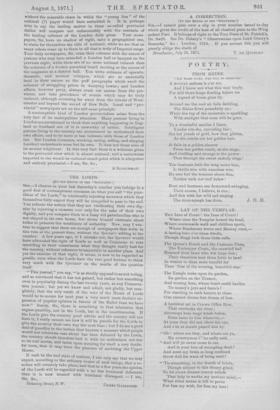THE LORDS.
TO THE EDITOR OF THE "SPECTATOR.")
tint,-.-I observe in your last Saturday's number you indulge in a good deal of contemptuous comment on what you call "the puer- ilities of the Lords," in continually rejecting measures which they themselves fully expect they will be compelled to pass in the end. You ridicule the notion that they arc vindicating their own dig- nity by rejecting a measure once only for the sake of their own dignity, and you compare them to a fussy old paterfamilias who is not obeyed in his own house, but shows himself obstinate about trifles to preserve the semblance of authority. Now, may I ven- ture to suggest that there are enough of newspapers that write in this vein at the present time, without the Spectator adding to the number. A few years ago, if I mistake not, the Spectator would have advocated the right of Lords as well as Commons to vote according to their consciences what they thought really best for the country, without reference to majorities in another place. And yet the exercise of that right, it seems, is now to be regarded as puerile, oven when the Lords have the rare good fortune to think very much with the Spectator on the merits of the question itself.
"This journal," you say, "is as stoutly opposed to secret voting, and as convinced that it has not gained, but rather lost something even in popularity during the last twenty years, as any Conserva- tive journal ; but yet we know and admit, not gladly, but com- pletely, that the only result of the veto of the House of Lords would be to secure for next year a very much more decisive ex- pression of popular opinion in favour of the Ballot than we have now," Surely, Sir, there is something in that admission that argues puerility, not in the Lords, but in the constituencies. If the Lords give the country good advice and the country will not have it, I really cannot see how it will be puerile for the Lords to give the country their own way the next time ; but I do see a good deal of puerility in the notion that because a measure which people would not otherwise care about has been defeated by the Lords, the country should therefore hail it with an enthusiasm not due to its real merits, and insist upon securing for itself a very doubt- ful boon, that it may have the pleasure of snubbing the Upper House.
If such be the real state of matters, I can only say that we may expect, according to the ordinary course of such things, that a re- action will certainly take place, and that in a few years the opinion of the Lords will be regarded with a no less irrational deference than it is now treated with irrational disrespect. — I am, Sir, &c.,
































 Previous page
Previous page